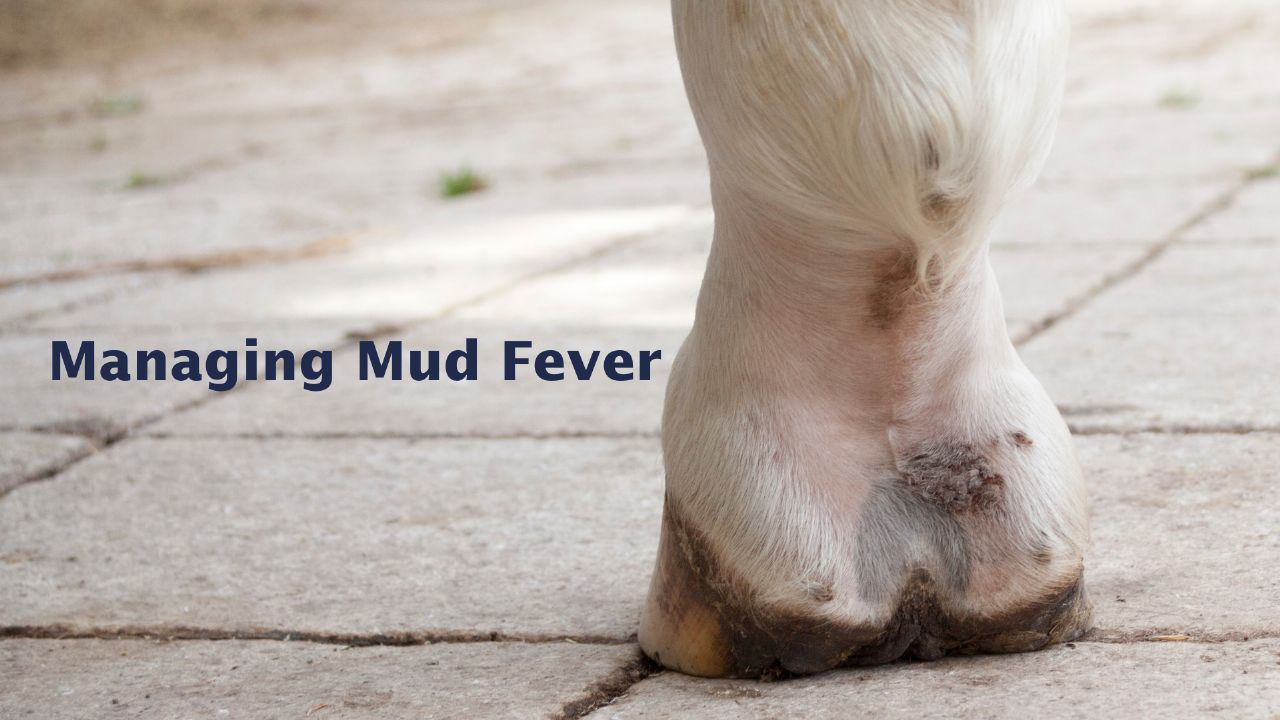Equine Pastern Dermatitis, more commonly referred to as mud fever or mud rash, is a non-contagious skin condition affecting the lower limbs of horses, particularly those with white legs/pink skin or thin-skinned breeds such as Thoroughbreds.
It can occur at any time of year but is typically more prevalent in winter when we experience consistently wet and muddy conditions. It can equally affect stabled horses standing in deep, wet or dirty beds for long periods or competition horses who may have their legs washed frequently. Horses with a weakened immune system are more susceptible to infection in general so it may also occur as a secondary condition to an injury or illness.
In cases of mud fever, matted hair, scabs or even sores appear on the heels or lower limb and these may be accompanied by heat, pain, swelling and in severe cases, lameness. Some horses resent the area being touched which can make treatment difficult.
Avoiding it in the first place is often key so try to ensure your horse spends at least some of the day on dry ground. This may be achieved by careful field rotation to avoid poaching or bringing them in for some of the day onto hard standing or stabling with dry, clean bedding.
If legs become muddy, do not wash them off and instead remove dried mud later with a soft brush. If you must wash legs off, dry them thoroughly afterwards with a clean towel - very feathery breeds may need to be clipped as it will make affected areas easier to treat and keep dry.
Barrier creams should only be applied to already clean and dry legs, or they risk creating the perfect environment for bacteria to thrive. If using turnout boots, they should be well fitting as any rubbing will weaken the skin and make it more permeable.
Gentle cleaning, softening and removal of any scabs will allow air to circulate and promote healing but proceed with caution as horses can be very reactive to this.
In persistent or severe cases, veterinary intervention may be required and your vet should always be consulted if your horse shows obvious signs of pain, swelling or lameness. Topical or oral antibiotics may be prescribed, sometimes in conjunction with a skin scrape or blood test, for a more targeted approach.
The same bacteria implicated in mud fever, can also cause rain scald, a skin condition seen on the neck, backs or quarters of horses living out in persistent wet conditions or those who sweat excessively due to workload or over rugging. The hair typically forms tufts and comes away in scabs but do get your vet to rule out other contagious conditions such as ringworm. Treatment is much the same - horses living out should have ample shelter in the field or be brought in to dry off fully for some of the day when conditions are persistently wet. Rug appropriately and only if necessary, and whilst good grooming will remove sweat and clumps of mud that can harbour bacteria, do not over groom horses living out un-rugged, as this can remove essential protective oils from the coat.
To help from the inside out you can feed
Eclipse Recovery to
support the immune system and all of our
forage balancers contain ingredients that offer potential anti-inflammatory support and help condition or strengthen the coat.
MalleMash is a useful 'one bag' feed to help support
horses with mud fever or
rain scald.
Our
equine nutrition experts are available to offer free feeding and management advice. Please feel welcome to contact the Feed Line on 01728 604 008 or request a free Feed Plan by completing our
online form.
